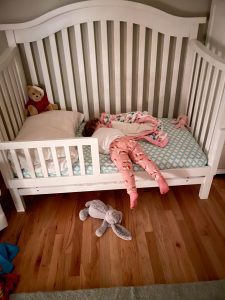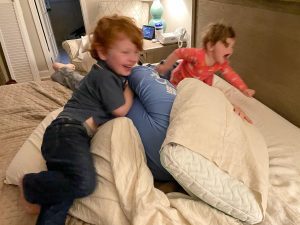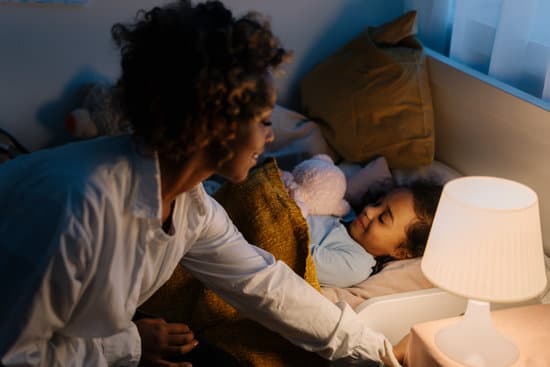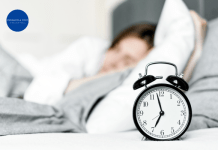
We all know sleep is important for our kids (and us!), but I recently had the chance to chat with Gulnur Com, MD, and Sonia Smith, DNP at the Studer Family Children’s Hospital at Ascension Sacred Heart Pediatric Sleep Center, about why it is so critical to their overall health. It was a fascinating discussion, and I’m so glad to know we have a great partner for our kids right here in Pensacola to help with all things sleep-related.
How Much Sleep Do Kids Need?
A lot!
Kids need more sleep than adults to foster healthy brain growth. The majority of a child’s brain development occurs by age six, making young children’s sleep especially critical.

Sleep allows our brains to create memories so that we can process what we’ve seen and experienced during the day. The sleep cycle runs about every ninety minutes, and we need enough of those cycles to pattern through deep sleep and dreams (which usually occur in the second half of the night). For kids who are seeing and experiencing so many new things every day, this is critical to fully develop their understanding of the world around them.
The brain also uses sleep time to remove toxic substances that build up during the day (who knew?!) and to signal the release of the human growth hormone (HGH). HGH is essential for those quickly evolving little bodies to grow and develop.
For more information on how much sleep your child should be getting, check out the American Academy of Pediatrics guide.
What Happens When Kids Aren’t Getting Enough Sleep?
I know I am preaching to the choir when I relay some of the problems that can occur. Cranky little people? We’ve all been there. But the very real and long-lasting health issues go further than I realized.
Chronic behavior and attention problems can occur, and a lack of sleep has even been linked to depression and obesity. Furthermore, if a child is dealing with a chronic infection, their body needs regular sleep to fight off and control it.
One of the Pediatric Sleep Center aspects that I was most impressed by was the holistic look at children and any issues they are experiencing.
Dr. Smith pointed out that poor sleep is often dismissed as a symptom instead of a disease, leading to all kinds of misdiagnoses.
Kids who aren’t getting enough sleep can have attention problems, and some actually rev their energy into overdrive when they get tired.
Anyone else’s kids look like they could go out and run a marathon right before bedtime?
These are classic indicators of ADHD, which the child, of course, may actually have and for which they would need treatment. However, Dr. Com and her team stress the need to look at a child’s sleep patterns as part of their overall health picture. If a lack of good sleep is causing that attention span and overactive energy, let’s treat the sleep issue first and see if that can resolve the other challenges.

What Can We Do to Help Kids Sleep?
One of the things I remember being most surprised about during the newborn phase was “teaching” your baby to sleep. It seems like an instinct we would have on arrival, but healthy sleep habits are a learned skill. As parents, it’s our job to ensure kids have sufficient time and the right environment for good sleep.
Noise, temperature, electronics, or even a rowdy pet can all affect how well a child will sleep. As worn out as we can get during the day, a wind-down before bed is an essential part of wrapping up our kids’ days and setting them up for sleep success. Reading and intentional time with our kiddos are two components that are important to incorporate into bedtime routines.
Dr. Com also pointed out the unique challenges that Covid-19 has created with our kids’ sleep patterns. Without their normal activities or school routines, many kids have lost their daytime vs. nighttime rhythms. Teenagers have been especially affected: they’re not burning off as much energy during the day, leading them to stay up later at night, which in some cases is leading to increased anxiety or even depression.
What to Watch For
Dr. Smith put it clearly: if your child isn’t sleeping well, that’s not normal! So if you’ve turned the lights down, the TV is off, and the house is quiet, but something still seems a little bit off, you can do a simple home screening.
Watch for these three things:
- Does your child snore?
- Is your child sleepy during the day?
- Does your child have a hard time falling and/or staying asleep? (think springing up for that “last hug” after bedtime, or constantly getting up in the middle of the night for a snack or something other than a bathroom run)
If yes to any of these, it’s time to chat with your pediatrician or primary care doctor. They can take a look to see if the concerns warrant a referral to a sleep center.
In Pensacola, we are fortunate to have the Studer Family Children’s Hospital’s five-bedroom sleep lab tailored especially to children. Your child can go for an overnight stay, during which the team will collect tons of data (on movement, breathing patterns, etc.) to evaluate. From there, they can better understand what might be causing poor sleep and how to help improve your child’s sleep.
Treatments
One of the most common issues causing poor sleep is sleep-disordered breathing (apnea). While asleep, for some reason, your child may not be getting enough air and start struggling to breathe. This jolts the brain awake to fully engage in breathing, but of course, disrupts the sleep pattern. Depending on what the doctors find in your child’s sleep evaluation, they may suggest surgery on the adenoids or tonsils or craniofacial surgery if there are bone structure issues. Otherwise, your child may be fitted with a CPAP machine to assist their breathing during the night.
Other challenges ranging from autism to obesity can affect a child’s sleep. The Sleep Center at the Studer Family Children’s Hospital takes a truly holistic approach to help kids and their families address these issues. A full team can include a nutritionist, social worker, or occupational therapist, depending on the child’s challenges.
Dr. Com and Dr. Smith both stressed that the family is the most important member of this team!
They view the whole family unit as their patient and tailor treatments that will actually work with your life. We would all love to have a healthy meal for our kids in the evening and a nice quiet bedtime routine, but in reality, it’s just not an option on a lot of days. Your team at the Studer Family Children’s Hospital works with you and other community resources to find a way for your child to get what they need to rest well.












